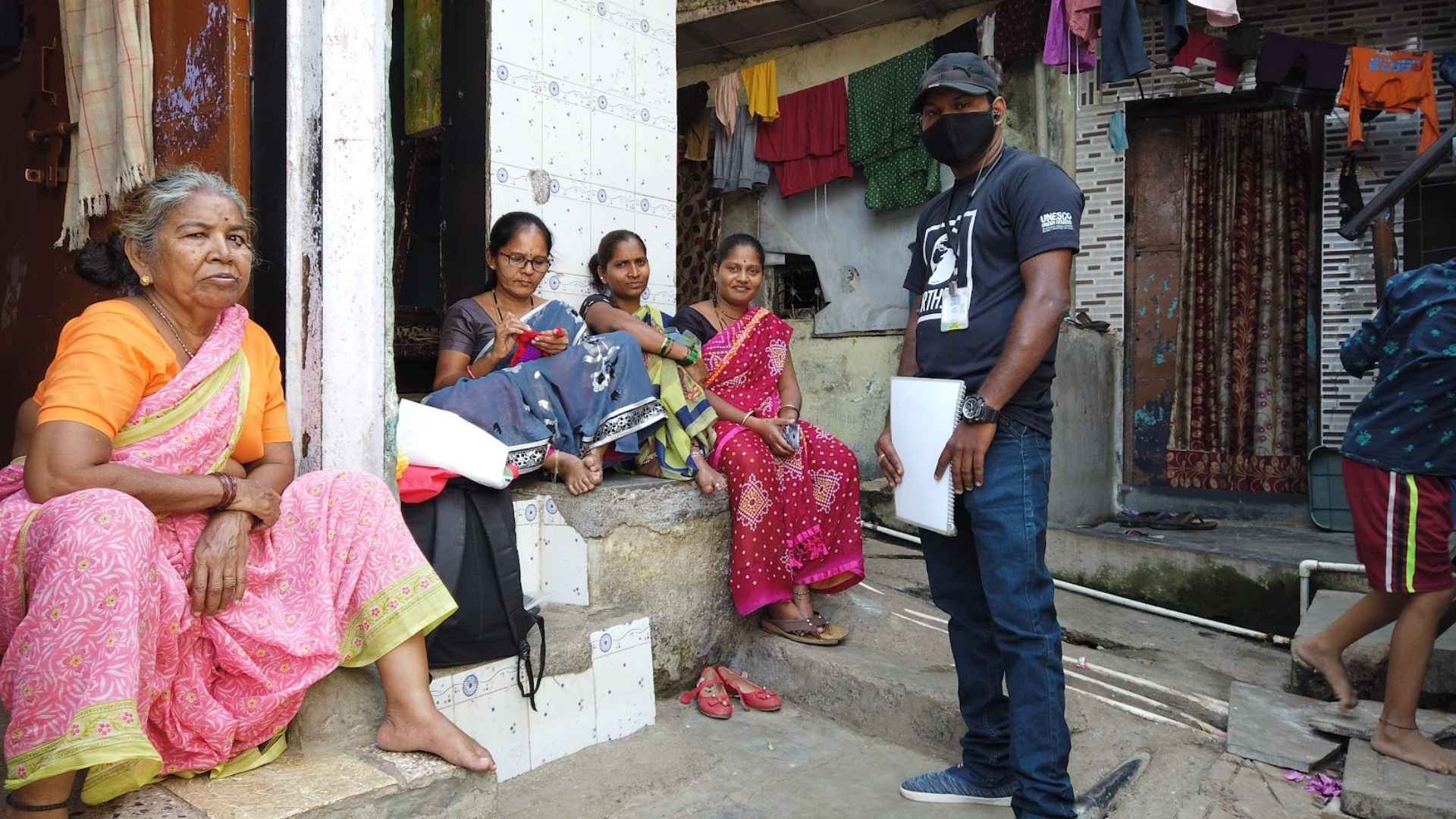The zero-waste concept aims to minimize waste generation by rethinking consumption patterns, promoting reuse, and ensuring effective recycling. It focuses on a circular economy where resources are conserved, and landfill waste is drastically reduced. Earth5R, a global environmental organization, has pioneered a Zero-Waste Society Framework emphasizing community participation in waste segregation and management.
By empowering local communities with education, technology, and sustainable practices, Earth5R fosters behavioral change at the grassroots level. A community-driven approach is vital for sustainability, as it enhances waste segregation efficiency, reduces pollution, and ensures long-term environmental benefits through collective responsibility and localized waste solutions.
Zero waste is a sustainability approach that aims to eliminate waste through responsible consumption, efficient recycling, and circular economy principles. In modern society, rapid urbanization and consumerism have led to escalating waste generation, overwhelming landfills, polluting ecosystems, and exacerbating climate change.
Globally, ineffective waste management systems struggle with segregation, recycling inefficiencies, and public non-compliance. Earth5R’s Zero-Waste Society Framework addresses these challenges through a community-centric model that empowers individuals to actively participate in waste segregation.
This article examines how Earth5R’s approach enhances waste management by fostering behavioral change, leveraging technology, and promoting decentralized, community-led solutions for a truly zero-waste society.
The Science Behind Waste Segregation
Improper waste management poses severe environmental and health hazards. Unsegregated waste contributes to air, soil, and water pollution, releases harmful greenhouse gases like methane from landfills, and promotes the spread of diseases through contaminated waste.
Open dumping and burning release toxic pollutants, impacting respiratory health and worsening climate change. Poor waste disposal also leads to microplastic accumulation in ecosystems, disrupting biodiversity and entering the food chain.
Scientific waste segregation categorizes waste into organic and inorganic, further classifying it as recyclable and non-recyclable. Organic waste (food scraps, garden waste) decomposes naturally and can be composted or converted into biogas. Inorganic waste includes plastics, metals, glass, and e-waste. Recyclables like paper, aluminum, and PET plastics can be reprocessed, reducing raw material demand and energy consumption.
Non-recyclables, such as certain plastics and hazardous waste, require specialized disposal methods to prevent environmental harm. Segregation at the source ensures efficient waste treatment, minimizes landfill burden, and enhances recycling efficiency.
Several case studies highlight the benefits of proper segregation. Indore, India, a city once struggling with waste mismanagement, implemented a strict waste segregation policy supported by public awareness campaigns. As a result, Indore ranked as India’s cleanest city for six consecutive years, diverting over 80% of its waste from landfills.
Similarly, San Francisco, USA, adopted a mandatory three-bin system, achieving an 80% waste diversion rate through composting and recycling. These examples demonstrate how systematic segregation reduces landfill dependency, mitigates pollution, and fosters a sustainable waste management ecosystem.
Earth5R integrates these scientific principles within its Zero-Waste Society Framework, ensuring community-led waste segregation practices contribute to environmental conservation and circular economy initiatives.
Earth5R’s Zero-Waste Society Framework
Earth5R’s Zero-Waste Society Framework is designed to address waste management challenges through a community-centric approach that prioritizes behavioral change, education, and decentralized waste management.
The framework is built on the five core principles of waste management: Reduce, Reuse, Recycle, Recover, and Rethink (5Rs), ensuring a comprehensive strategy for minimizing waste and promoting sustainability at the grassroots level.
Core Principles: The 5Rs of Waste Management
The first step in waste management is Reduce, which focuses on minimizing waste generation at the source by promoting sustainable consumption habits, reducing single-use plastics, and encouraging eco-friendly product alternatives. Reuse emphasizes repurposing or refurbishing items that would typically be discarded, such as upcycling old clothes, using glass bottles instead of plastic, or repurposing electronic devices to extend their lifespan.
Recycle ensures that waste materials like paper, metals, and plastics are processed and transformed into new products, reducing raw material consumption and landfill waste. Recover involves extracting valuable materials or energy from waste through methods like composting organic waste for agriculture or converting plastic waste into fuel.
Finally, Rethink encourages a fundamental shift in mindset to view waste as a resource rather than a burden, emphasizing innovation, policy advocacy, and the creation of sustainable urban ecosystems. Together, these five principles form the foundation of a zero-waste society.
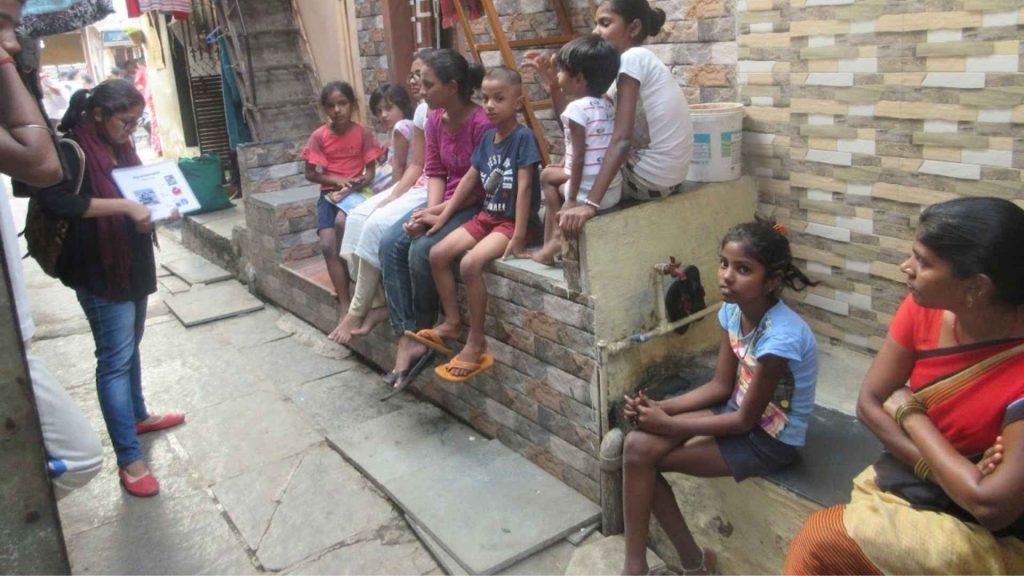
How the Framework is Structured to be Community-Centric
Earth5R’s model empowers local communities to take ownership of their waste management processes, integrating social, economic, and environmental dimensions. Instead of relying solely on centralized municipal waste systems, Earth5R fosters decentralized solutions where communities play an active role in segregation, collection, and processing.
This approach increases participation, ensures efficient waste handling, and creates economic opportunities. A key aspect of Earth5R’s community-centric structure is its Educational Initiatives, which involve conducting workshops in schools, residential areas, and businesses to promote awareness about proper waste segregation and sustainable practices.
Citizen Engagement Programs encourage households and communities to adopt waste segregation at the source through incentivized schemes and reward-based models. Additionally, Women-Led Sustainability Programs empower women and marginalized communities to actively participate in recycling and waste management, creating livelihood opportunities while fostering environmental responsibility.
Lastly, Public-Private Partnerships play a crucial role by collaborating with local governments, businesses, and NGOs to develop an integrated waste management infrastructure, ensuring policy support and incentives for community-driven initiatives. Together, these efforts drive sustainable waste management at the grassroots level.
Key Strategies Earth5R Employs to Drive Waste Segregation
Earth5R’s Zero-Waste Society Framework emphasizes Segregation at Source, encouraging households, schools, and businesses to sort their waste into organic, recyclable, and hazardous categories before disposal, making the recycling process more efficient.
To enhance collection efficiency, Smart Waste Collection Systems utilize tech-driven solutions like mobile apps, QR-coded bins, and AI-based waste tracking to monitor segregation practices. Likewise, Community Composting Projects promote decentralized composting units, effectively managing organic waste while reducing landfill dependency and producing natural fertilizers for urban farming.
The framework also integrates the Circular Economy by encouraging local businesses to use recycled materials and promoting sustainable supply chains to reintegrate waste materials into production cycles. To ensure lasting impact, Behavioral Change Campaigns leverage storytelling, digital outreach, and on-ground initiatives to shift public perception and encourage long-term commitment to waste segregation.
By embedding these strategies into local communities, Earth5R’s framework transforms waste management into an inclusive, self-sustaining ecosystem, proving that grassroots action is key to achieving a truly zero-waste society.
Case Study: Transforming Powai into a Zero-Waste Community – An Earth5R Initiative
Background
Powai, a bustling suburban neighborhood in Mumbai, faced severe waste management challenges due to rapid urbanization, high population density, and inadequate waste segregation practices.
The majority of household and commercial waste ended up in landfills, contributing to environmental degradation and public health hazards. Recognizing the urgency of the issue, Earth5R launched a zero-waste initiative in Powai to implement community-driven waste segregation and circular economy solutions.
Implementation of Earth5R’s Zero-Waste Framework
Earth5R introduced a multi-faceted approach to transform Powai into a sustainable, waste-responsible community, structured around the 5Rs – Reduce, Reuse, Recycle, Recover, and Rethink to ensure long-term waste management solutions.
To drive community engagement and awareness, Earth5R conducted door-to-door campaigns educating residents on source segregation, providing color-coded waste bins for organic, recyclable, and non-recyclable waste. Likewise, workshops in schools, businesses, and housing societies promoted sustainable habits and encouraged active citizen participation.
Integrating smart waste management solutions, Earth5R partnered with local authorities to introduce QR-coded bins and AI-based waste tracking, ensuring better segregation monitoring and optimizing waste collection routes. Households were further incentivized through reward-based recycling programs, where points earned for responsible waste disposal could be redeemed for eco-friendly products.
To reduce landfill dependency, decentralized waste processing was introduced through community composting units, converting organic waste into nutrient-rich compost for urban farming. Additionally, recycling stations were established, directing plastics, paper, and metal waste to local recycling industries, fostering a circular economy.
The initiative also championed women-led sustainability programs, where underprivileged women were trained in waste sorting and upcycling, creating employment opportunities while promoting sustainability. These women crafted eco-friendly products from discarded materials, such as upcycled bags and home decor, which were then sold in local markets.
Through these integrated strategies, Earth5R successfully fostered a community-driven zero-waste model, proving that grassroots initiatives can drive systemic environmental change.
Impact & Results
Within six months, the Powai Zero-Waste Initiative achieved 60% waste segregation at the source, significantly reducing landfill contributions and improving overall waste management efficiency. The initiative successfully engaged over 5,000 households, 20 schools, and 50 businesses, fostering a widespread behavioral shift toward responsible waste disposal and sustainability practices.
As well, the community composting program played a crucial role in diverting over two tons of organic waste per month, helping to reduce methane emissions from landfills while producing nutrient-rich compost for urban farming. The women-led sustainability program further strengthened the initiative by providing employment opportunities to over 30 women, empowering them financially while promoting eco-friendly waste management solutions.
These collective efforts not only contributed to a cleaner and more sustainable Powai but also demonstrated the scalability and impact of Earth5R’s community-driven zero-waste model.
The Powai Zero-Waste Initiative by Earth5R is a testament to the power of community-driven waste management. By integrating awareness, technology, decentralized waste processing, and circular economy principles, Earth5R successfully demonstrated that grassroots action can lead to a sustainable, zero-waste society. This model can be replicated in urban centers globally, proving that local engagement is key to tackling global waste challenges.
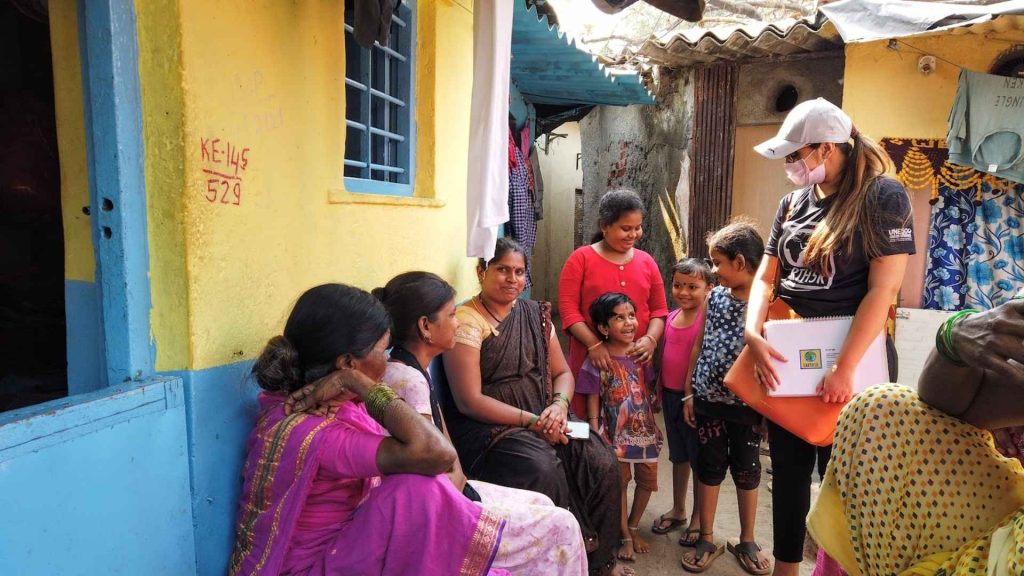
The Role of Community Engagement in Waste Segregation
Community engagement is a crucial factor in effective waste segregation, as citizen participation ensures sustainable waste management at the grassroots level. When individuals actively separate their waste into organic, recyclable, and non-recyclable categories, the overall efficiency of waste collection, recycling, and disposal improves significantly.
Without community involvement, waste segregation efforts often fail due to improper disposal practices, lack of awareness, and inadequate infrastructure. Engaging local communities fosters a sense of responsibility, reduces landfill waste, and enhances the circular economy by ensuring materials are reused and recycled effectively.
Earth5R plays a pivotal role in driving behavioral change through educational initiatives that encourage sustainable waste management practices. The organization conducts workshops, awareness campaigns, and training sessions in schools, residential communities, and businesses to educate citizens about the environmental and economic benefits of waste segregation.
By integrating digital outreach and storytelling, Earth5R ensures that sustainable habits become part of everyday life. As well, it implements incentivized programs that reward individuals and communities for their commitment to proper waste disposal.
Several success stories highlight the impact of community-led waste segregation programs. In Mumbai, Earth5R’s initiative transformed a neighborhood struggling with waste mismanagement into a model zero-waste community through awareness campaigns and decentralized composting.
Similarly, in Bengaluru, Earth5R partnered with local residents to implement waste segregation at the household level, leading to a significant reduction in landfill waste and increased recycling rates. These examples demonstrate that when communities take ownership of waste management, long-term environmental benefits follow.
By fostering active citizen participation and behavioral change, Earth5R’s community-centric approach proves that collective action is essential for achieving a zero-waste society.
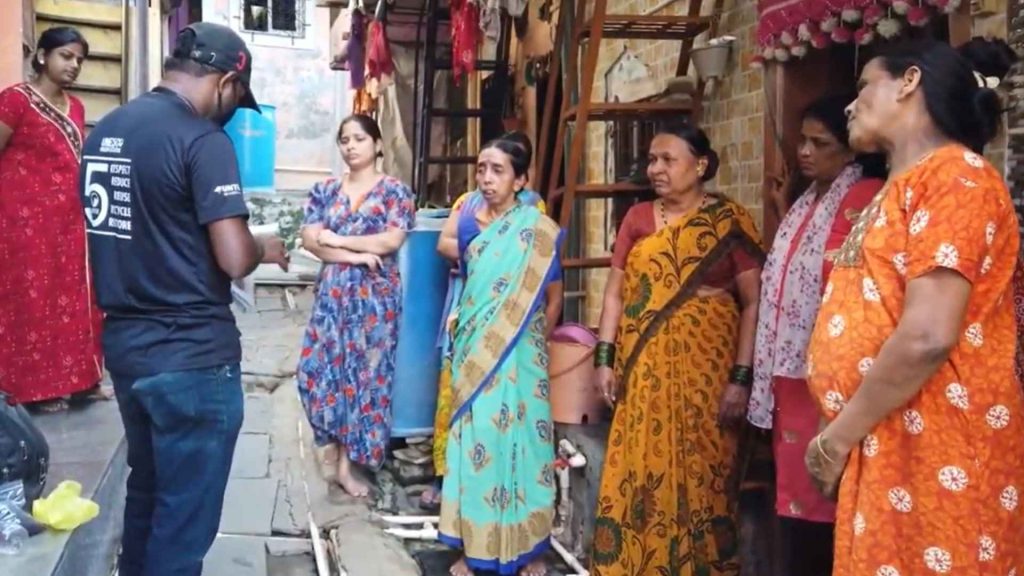
Technological and Policy Support for Community-Centric Waste Management
Technology plays a transformative role in enhancing waste segregation efficiency and ensuring the success of community-driven waste management initiatives. Digital tools such as mobile applications, AI-driven waste tracking, and data analytics help monitor waste generation patterns, optimize collection routes, and improve recycling rates.
For example, smart waste bins equipped with QR codes and IoT sensors enable real-time tracking of waste segregation compliance, allowing municipalities and organizations like Earth5R to identify gaps and implement corrective measures. AI-powered waste sorting systems further streamline recycling processes by automating material identification and separation, reducing contamination in recycling streams.
On the top of that, blockchain technology is emerging as a tool for tracking waste streams, ensuring transparency in recycling processes, and incentivizing responsible waste disposal.
Alongside technological advancements, government and policy support are critical to scaling community-centric waste management frameworks. Policies that mandate source segregation, extended producer responsibility (EPR), and incentives for sustainable waste practices encourage both citizens and businesses to adopt responsible waste disposal behaviors.
Governments can introduce tax benefits, subsidies, or carbon credits for organizations implementing zero-waste initiatives. Local authorities must also invest in waste treatment infrastructure, public awareness campaigns, and partnerships with NGOs and private sector stakeholders to create an ecosystem where community-led waste management thrives.
Several cities have successfully implemented technology-driven and policy-backed waste management models. For instance, San Francisco’s Zero Waste Program utilizes strict policies, public participation, and technological interventions to achieve an 80% waste diversion rate.
Similarly, South Korea’s Pay-As-You-Throw (PAYT) system enforces strict waste segregation by charging households based on the amount of non-recyclable waste they produce, significantly increasing recycling efficiency. These case studies illustrate that a combination of technology, community participation, and strong policy frameworks is essential for creating sustainable, zero-waste societies.
Challenges and Solutions in Implementing the Zero-Waste Society Framework
Implementing a zero-waste society framework presents several challenges, including lack of awareness, inadequate infrastructure, and policy gaps. Many communities lack proper education on waste segregation, leading to contamination of recyclable materials.
Not to mention, inefficient or nonexistent waste management infrastructure, such as insufficient recycling facilities or lack of composting units, prevents effective processing of segregated waste. Policy gaps, including weak enforcement of waste management regulations and limited incentives for sustainable practices, further hinder progress.
Socioeconomic barriers, such as resistance to behavioral change and financial constraints, also make large-scale adoption of zero-waste practices difficult. To address these challenges, cities and organizations have implemented successful solutions and best practices.
Educational campaigns and community engagement programs, like those led by Earth5R, raise awareness and encourage responsible waste segregation at the household level. In cities like San Francisco, strict waste sorting policies, coupled with financial incentives for recycling, have led to an 80% waste diversion rate.
Similarly, Sweden’s waste-to-energy model ensures that non-recyclable waste is converted into electricity, reducing landfill dependency. Infrastructure improvements, such as decentralized composting units and smart waste tracking systems, also enhance waste management efficiency.
A multi-stakeholder collaboration between governments, NGOs, corporations, and citizens is crucial for the success of zero-waste initiatives. Governments must implement and enforce policies that mandate source segregation and promote circular economy practices.
NGOs play a critical role in educating communities and advocating for policy changes, while corporates can contribute by adopting sustainable production practices and supporting recycling initiatives.
Citizens, as the primary waste generators, must actively participate in segregation and waste reduction efforts. By fostering collaboration among these stakeholders, cities can develop self-sustaining, community-driven waste management ecosystems, paving the way for a truly zero-waste society.
Future Prospects and Scalability
Earth5R’s Zero-Waste Society Framework has the potential to be scaled to other regions by leveraging its community-centric approach, adaptable strategies, and technology-driven solutions.
The model can be expanded by replicating its educational initiatives, decentralized waste segregation systems, and circular economy integration in urban and rural settings. Key factors for scalability include strong local leadership, digital tools for waste tracking, and collaborations with municipalities and businesses.
Customization to regional contexts—such as tailoring waste segregation methods to local waste compositions and cultural practices—will further enhance its adaptability. With the rise of smart cities, integrating Earth5R’s model into urban planning policies can significantly improve waste management efficiency worldwide.
The future of community-led waste management initiatives lies in a combination of technology, behavioral change, and decentralized waste solutions. Advancements in AI-driven waste sorting, blockchain for waste traceability, and IoT-enabled smart bins will make community waste segregation more efficient and transparent.
Citizen-driven initiatives, such as neighborhood composting and peer-led awareness campaigns, will continue to drive behavioral shifts. Moreover, partnerships between governments, corporations adopting Extended Producer Responsibility (EPR) policies, and grassroots organizations will ensure long-term sustainability of these initiatives.
To support zero-waste initiatives globally, several policy recommendations can be adopted. Governments should enforce strict waste segregation laws, offer financial incentives for recycling and composting, and invest in waste-processing infrastructure. Policies should mandate producer responsibility, requiring companies to design recyclable packaging and take accountability for post-consumer waste.
Public-private partnerships can facilitate large-scale implementation, and international cooperation can help developing nations access funding and technological expertise for waste management. By integrating policy support, community engagement, and innovative technologies, the Earth5R model can serve as a global blueprint for achieving a sustainable, zero-waste future.
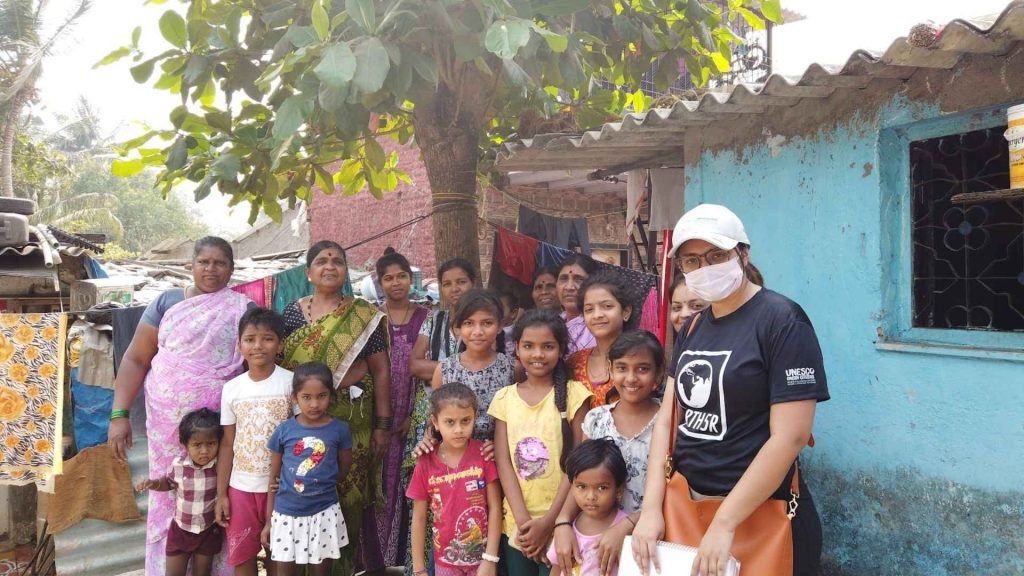
Empowering Communities for a Zero-Waste Future
The transition to a zero-waste society requires a systematic, community-driven approach that prioritizes waste segregation, recycling, and resource recovery. This article has highlighted how Earth5R’s Zero-Waste Society Framework effectively integrates education, technology, policy support, and behavioral change to create a sustainable waste management model.
By focusing on the 5Rs—Reduce, Reuse, Recycle, Recover, and Rethink— Earth5R ensures that waste is minimized at the source, materials are repurposed efficiently, and communities actively participate in long-term environmental sustainability. The integration of smart waste collection systems, decentralized composting, and circular economy strategies further enhances waste segregation efforts.
A community-centric approach is critical to achieving a zero-waste society. Citizen engagement in waste segregation, composting, and recycling programs plays a pivotal role in reducing landfill waste and ensuring proper resource utilization. Education and awareness campaigns help shift public perception, while incentives and policy support encourage individuals and businesses to adopt sustainable practices.
The involvement of governments, NGOs, and corporations in waste management further strengthens the impact, creating a multi-stakeholder ecosystem where waste is managed efficiently at every level. Case studies from around the world, including successful implementations in San Francisco, South Korea, and Sweden, demonstrate that when communities take ownership of waste management, sustainable outcomes follow.
Earth5R’s framework offers a scalable and adaptable model that can be implemented globally to address waste challenges in diverse regions. By leveraging technology, fostering behavioral change, and advocating for strong policy interventions, the framework proves that a zero-waste society is not just an aspiration, but an achievable reality.
With continued collaboration, innovation, and commitment, communities worldwide can transform waste management from a crisis into an opportunity, paving the way for a cleaner, more sustainable future.
FAQs on Earth5R’s Zero-Waste Society Framework: A Community-Centric Approach to Waste Segregation
What is a zero-waste society?
A zero-waste society aims to eliminate waste by reducing, reusing, recycling, recovering, and rethinking materials to minimize landfill and environmental pollution.
How does waste segregation contribute to a zero-waste society?
Waste segregation ensures that different types of waste are properly managed, allowing recyclables to be repurposed, organic waste to be composted, and hazardous waste to be safely disposed of.
What is Earth5R’s Zero-Waste Society Framework?
Earth5R’s framework is a community-driven waste management model that focuses on education, technology, circular economy strategies, and policy advocacy to achieve zero waste.
How does a community-centric approach help in waste segregation?
Engaging local communities increases participation, ensures proper segregation at the source, and creates economic opportunities through recycling and composting initiatives.
What are the 5Rs in Earth5R’s waste management strategy?
The 5Rs – Reduce, Reuse, Recycle, Recover, and Rethink guide sustainable waste management by minimizing waste generation and maximizing resource recovery.
How does Earth5R encourage waste segregation at the household level?
Through educational campaigns, smart waste tracking, and reward-based programs, Earth5R motivates households to separate waste at the source.
What role does technology play in Earth5R’s waste management initiatives?
Earth5R integrates QR-coded bins, AI-based waste tracking, and data analytics to monitor segregation patterns and optimize waste collection.
What are smart waste collection systems, and how do they work?
These systems use mobile apps, sensors, and real-time data tracking to ensure efficient waste collection and minimize improper disposal.
How does Earth5R promote composting in communities?
By establishing decentralized composting units, Earth5R encourages households and businesses to convert organic waste into compost for urban farming.
How does the circular economy fit into the zero-waste framework?
A circular economy reintegrates waste into production cycles, ensuring that materials are reused, repurposed, or recycled instead of discarded.
What are the biggest challenges in implementing a zero-waste model?
Common challenges include lack of awareness, inadequate infrastructure, weak policy enforcement, and resistance to behavioral change.
How can local governments support zero-waste initiatives?
Governments can enforce strict waste segregation laws, invest in recycling infrastructure, and incentivize sustainable waste management practices.
How can businesses contribute to a zero-waste society?
Businesses can adopt eco-friendly packaging, implement waste audits, support recycling initiatives, and encourage employee participation in sustainability programs.
How does Earth5R engage women and marginalized communities in waste management?
Earth5R trains women from underserved communities in waste sorting, recycling, and upcycling, providing them with sustainable livelihood opportunities.
How can individuals help promote waste segregation in their communities?
By practicing waste segregation, spreading awareness, supporting local recycling programs, and advocating for better waste policies, individuals can drive meaningful change.
Has Earth5R successfully implemented its zero-waste framework in any communities?
Yes, case studies like Powai, Mumbai, show that Earth5R’s initiatives have led to higher waste segregation rates, reduced landfill dependency, and community empowerment.
What are the long-term benefits of adopting a zero-waste model?
A zero-waste model leads to cleaner cities, reduced pollution, conservation of natural resources, economic growth through green jobs, and better public health.
Can Earth5R’s model be implemented in other cities or countries?
Yes, the framework is scalable and adaptable to different regions, provided there is community engagement and policy support.
What policies should governments adopt to support a zero-waste future?
Governments should implement waste segregation laws, Extended Producer Responsibility (EPR) policies, tax incentives for recyclers, and bans on single-use plastics.
How can I get involved with Earth5R’s waste management initiatives?
You can volunteer, participate in awareness programs, support recycling initiatives, and advocate for sustainable policies to contribute to the zero-waste movement.
Join the Movement Towards a Zero-Waste Future!
The success of Earth5R’s Zero-Waste Society Framework proves that community-driven action can transform waste management and create sustainable, self-sufficient ecosystems. But achieving a zero-waste future requires collective effort—and that includes YOU!
Every small action counts. Start by segregating waste at home, reducing single-use plastics, and supporting local recycling and composting initiatives. Encourage your community, school, or workplace to adopt sustainable waste management practices. Get involved with environmental organizations, participate in clean-up drives, and advocate for stronger waste policies in your city.
Businesses, policymakers, and organizations must also take responsibility. Governments should enforce strict waste segregation laws and incentivize sustainable practices, while companies must adopt circular economy models and invest in eco-friendly production.
Join hands with Earth5R and other sustainability advocates to create a world where waste is not a burden, but a resource. Whether you are a student, professional, policymaker, or entrepreneur, your involvement can drive real change. Let’s build a cleaner, greener, and more responsible planet—one community at a time!
Are you ready to make a difference? Start today!
~Authored by Ameya Satam

